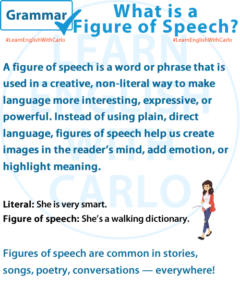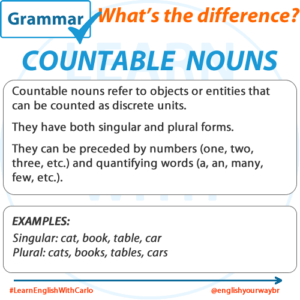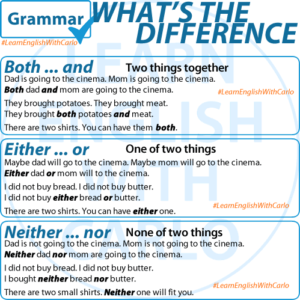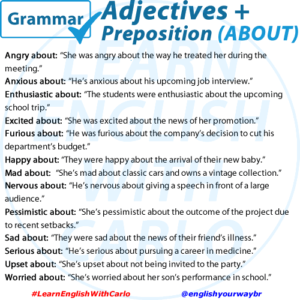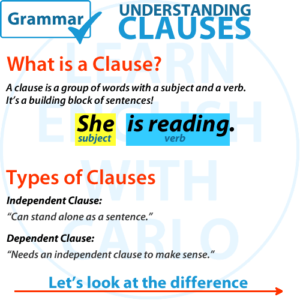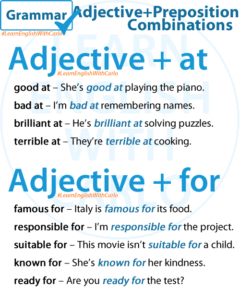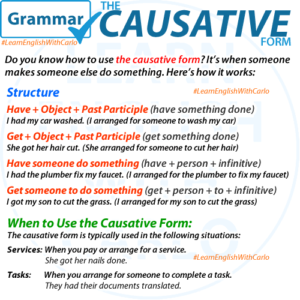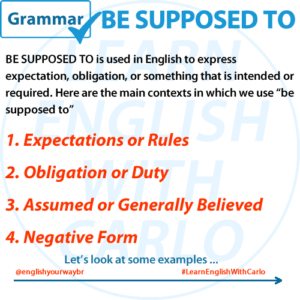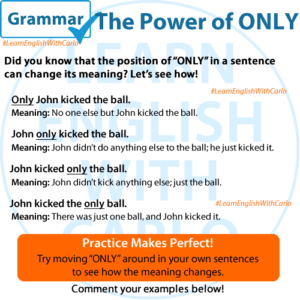Figures of speech are words or expressions used in a non-literal, creative way to make language more vivid and expressive.Writers and speakers use them to create imagery, add emotion, and make ideas easier to remember. They’re common in stories, songs, poetry, and everyday conversation. Literal: She is very smart.Figure of speech: She’s a walking dictionary. …
Category: INSTAGRAM
Images I've posted to Instagram
Permanent link to this article: https://englishyourway.com.br/figures-of-speech-in-english/
Jan 09
GRAMMAR – Countable and Uncountable Nouns
Countable and uncountable nouns are two categories used to classify nouns based on whether they can be counted or not. Countable Nouns:Countable nouns refer to objects or entities that can be counted as discrete units.They have both singular and plural forms.They can be preceded by numbers (one, two, three, etc.) and quantifying words (a, an, …
Permanent link to this article: https://englishyourway.com.br/grammar-countable-and-uncountable-nouns/
Jan 08
GRAMMAR – Both – Either – Neither
Both … andTwo things togetherMom is going to the cinema. Dad is going to the cinema.Both Mom and Dad are going to the cinema.They bought potatoes. They bought meat.They bought both potatoes and meat.There are two shirts. You can have both this one and that one.. Either … orOne of two thingsMom and Dad have …
Permanent link to this article: https://englishyourway.com.br/grammar-both-either-neither/
Jan 07
Adjectives + Prepositions (ABOUT)
Let’s continue our dive into the fascinating world of adjectives paired with prepositions! In English, certain adjectives are commonly followed by specific prepositions to express various relationships, attitudes, and qualities. Understanding these combinations can greatly enhance our language skills and enrich our expressions. Join me as we explore some examples of adjectives paired with prepositions …
Permanent link to this article: https://englishyourway.com.br/adjectives-prepositions-about/
Jan 05
Understanding Clauses in English Grammar
A clause is a group of words that contains a subject and a verb. Clauses are essential building blocks of sentences, and understanding them can help you improve your writing and speaking skills. Types of Clauses Clauses can be divided into two main types: What is an Independent Clause? An independent clause expresses a complete …
Permanent link to this article: https://englishyourway.com.br/clauses-in-english-grammar/
Jan 04
Adjective + Preposition Combinations
Mastering adjective + preposition combinations is an important step toward sounding natural and confident in English. These expressions—like interested in, good at, or afraid of—are common in everyday conversation, but they don’t always follow clear rules. That’s why it helps to learn them in groups. Below, you’ll find examples organized by preposition to help you …
Permanent link to this article: https://englishyourway.com.br/adjective-preposition-combinations/
Jan 03
The Causative Form
The causative form is a grammatical structure used when one person causes another person to do something. It’s a common form in English and is often used to indicate that someone has arranged for an action to be done by someone else. Structure of the Causative Form There are two main ways to form the …
Permanent link to this article: https://englishyourway.com.br/the-causative-form/
Jan 01
Understanding “Be Supposed To” in English
English learners often encounter the phrase “be supposed to” in everyday conversations. It’s a common expression used to talk about expectations, obligations, rules, and assumptions. In this post, we’ll explore what “be supposed to” means, how it’s used, and the grammatical rules that guide its usage. 1. What Does “Be Supposed To” Mean? “Be supposed …
Permanent link to this article: https://englishyourway.com.br/be-supposed-to-usage-in-english/
Dec 31
GRAMMAR – Another and Other
Use of Another and Otheranother + singular noun (Have another sandwich.) another (Thanks. I’ll have another.) other + plural noun (I wonder if there is life on other planets.) determiner + other + noun (There may be life on some other planets.) determiner + other (“I have one book.” “I have the other.”) Another means …
Permanent link to this article: https://englishyourway.com.br/grammar-another-and-other/
Dec 30
Understanding the Correct Placement of “Only”
Using “only” correctly can make a big difference in the meaning of a sentence. It’s a small word with a powerful impact! Let’s dive into how to place “only” correctly to convey the exact meaning you want. Understanding the Role of “Only”: “Only” is a versatile word that can modify different parts of a sentence. …
Permanent link to this article: https://englishyourway.com.br/correct-placement-of-only-in-sentences/

